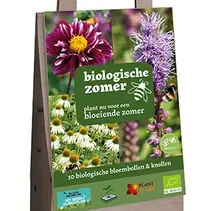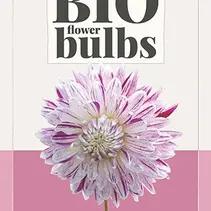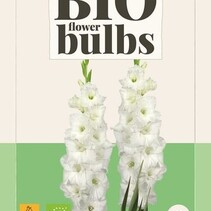Do your bit too, Organic flower bulbs for a better environment!
- Delivery costs depending on the country
- Snelle Levering (per product vermeld)
- Gratis bezorging vanaf 60 euro
Buy colourful organic flower bulbs for a healthy and better environment?
Beautiful and environmentally friendly!
Organic flower bulbs are annual or biennial flowering plants grown for their beauty and fragrance. Highly regarded for their ability to add colour and texture to any garden, they are an excellent choice for environmentally conscious gardeners as they are grown without the use of pesticides or chemical fertilisers! This makes them completely safe for pets and wildlife, and helps create a healthy and sustainable environment for you and your community.
Features
Organic flower bulbs are perennial plants that grow from an important underground organ: the bulb. The bulb serves as an energy store and contains all the nutrients the plant needs to grow and flourish. It is also an essential organ that allows the plant to survive during periods of dormancy. These plants come in a wide range of sizes, shapes and colours. The most popular varieties are tulips, daffodils, hyacinths and crocuses. They all have unique characteristics, but all share their natural, simple and timeless beauty.
Their leaves are usually narrow and oblong, arranged in a rosette at the base of the plant, and are green or blue-green in colour, depending on the species. The flowers are varied and can be trumpet-shaped, star-shaped or bell-shaped. They can be single or double, and come in all sorts of colours, from pure white to pink, red, orange, yellow and beautiful shades of purple and blue! In some species, the flowers emit a remarkable sweet fragrance, which is highly valued in the production of perfumes and cosmetics. In terms of flowering, the active life of these plants can vary from one year to several years. In other words, some species have to be replanted every year to enjoy new blooms, while others come back naturally and bloom systematically, year after year.
Besides their decorative qualities and fragrance, organic flower bulbs also play a very important ecological role. In particular, their flowers are an important source of food for many pollinating insects such as bees and butterflies, which they attract en masse. Their presence thus contributes to garden biodiversity. They are also said to have various medicinal properties and are used in the preparation of some herbal medicines.
Some notable varieties of organic flower bulbs
- Dahlias
- Gladioli
Our practical advice for successfully planting your organic flower bulbs
When buying your bulbs, check the quality carefully: avoid soft, discoloured or damaged bulbs, as they have little chance of growing well. For spring flowering, the Bakker experts recommend planting your organic flower bulbs in autumn. This gives them enough time to establish themselves in the ground before the first winter frosts. To do this, first choose a suitable location with well-drained soil and a sunny or partly shaded position. Avoid places where water tends to stagnate, as this can cause fungus and rot problems that are very detrimental to the health of your plants. Also, make sure your plants get at least six hours of sunlight a day.
Tilt the soil carefully and top it up with organic material such as compost or well-digested manure to improve the structure of the soil and provide essential nutrients to the bulbs. Once the soil is prepared, dig the planting holes. Each bulb should be planted in its own hole to a depth of three times its height, with the tip pointing upwards. It is also important to leave enough space between the holes to allow the future plants to grow properly. In practice, each bulb should be separated from its neighbour by a space of at least twice its diameter, i.e. about 10 to 15 cm.
Once in place, carefully cover the bulb with the soil and compost or manure mixture and lightly tamp it to eliminate air pockets. Finish with a good watering to encourage rooting and there you have your organic flower bulb! If you live in an area where rodents and birds are potential predators for your bulbs, consider protecting them with a suitable protective net or mesh.
How do you care for your organic flower bulbs?
Organic flower bulbs are undemanding plants that are easy to care for. The most important thing for their well-being is to water them regularly. Bakker's experts recommend watering about every 7 days until the shoots emerge from the ground. More generally, the soil should be kept moist throughout the growing period, but not soggy. In other words, do not let the soil dry out completely between waterings, and make sure there is no standing water, as this can cause root rot. To help retain moisture, consider adding a layer of mulch around the base of your plants. This is also a simple and effective way to regulate soil temperature and prevent weeds from growing.
After flowering, your plants should be well fed so that they can store enough energy for the next growing season. Bakker's experts recommend using a slow-release organic fertiliser. This should be applied according to the manufacturer's instructions to avoid overfeeding, which can damage the roots.
It is also important to protect your valuable plants from diseases and pests. When gardening organically, use natural control methods such as using repellent plants and beneficial insects. Inspect bulbs regularly for signs of disease or infestation, and take immediate action if necessary to avoid complications! Use these inspections to remove spent flowers to encourage new growth. More generally, cut off wilted flower stems as soon as they have lost their colour or begin to wilt. This allows the plant to put more energy into producing new flowers.
Remember that the life of these bulbs is interrupted by a dormant period in winter, when they stop growing and flowering. During this period, it is essential not to water them and avoid stress: just let them rest! In spring, when temperatures rise, the bulbs come out of hibernation and start growing again.
The little extras that make a difference
By using Bakker Botanists' organic flower bulbs, you can help preserve the environment by avoiding the use of chemical pesticides and fertilisers, which can have a very negative effect on fauna and flora, as well as water quality. Moreover, these unique plants can be grown sustainably and reused year after year. This reduces the need to buy new bulbs every season and also reduces the amount of waste generated when gardening.
Moreover, organic flower bulbs are an important source of food for pollinators such as bees and butterflies, which are essential for pollinating plants. Their presence thus helps preserve biodiversity and the local ecosystem.
















